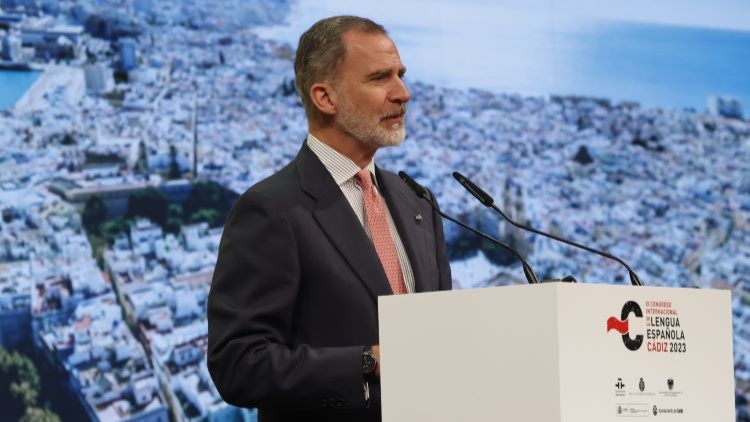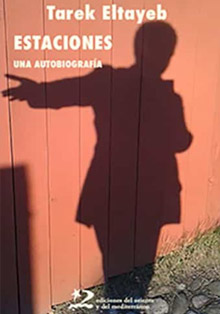Eduardo González
King Felipe VI affirmed yesterday in Cadiz, during the inauguration of the IX edition of the International Congress of the Spanish Language (CILE), that Spanish, “with all its rich variety”, is “a living, open language, which is being built by everyone every day as our societies change” and, therefore, “it is a project for the future of tomorrow”.
King Felipe and Queen Letizia presided yesterday, at the Gran Teatro Falla, the inauguration of the CILE, in which they were accompanied by the president of the Junta de Andalucía, Juan Manuel Moreno; the Minister of Foreign Affairs, José Manuel Albares; and the Ibero-American Secretary General, Andrés Allamand, among other authorities, personalities and ambassadors of the participating countries.
The IX International Congress of the Spanish Language is held every three years in the countries of the Spanish-speaking community. The IX CILE will take place from March 27 to 30 in Cadiz, the second Spanish city to host this event, after the 2001 edition in Valladolid. Under the slogan Lengua española, mestizaje e interculturalidad. Historia y futuro (Spanish language, miscegenation and interculturality. History and future), the IX CILE brings together almost 300 participants from all over the world in its academic program.
“The congresses have become a fundamental part of the policy of international promotion of Spanish language and culture, promoted from the beginning by the Royal Spanish Academy (RAE), the Association of Spanish Language Academies (ASALE) and the Instituto Cervantes (IC),” said Felipe VI during his inaugural speech. “The great hispanist convocation that we are once again holding, this time in Cadiz, has become, due to its transcendence, dissemination and continuity, the most relevant event of the Spanish language,” he continued.
“This ninth edition will address a fundamental topic” such as “the relationship between the Spanish language and the native American languages”, because “Spanish, from its origins, is a mestizo language, and this mestizaje transcends social coexistence, education and the entire cultural, literary, artistic, infrastructure, architecture, medicine or law world; and it does so in all the nations that speak it”, continued the Monarch. “We hope to hear here, in Cadiz, the beautiful words coming from Nahuatl, Quechua, Quiché, Guaraní and other Amerindian languages that have become part of us, of our rich cultural diversity and of a great literature of worldwide scope”, he added.
“Originally planned to be held in Arequipa, the well-known circumstances in which Peru has been plunged advised a change of venue”, and therefore, “instead of meeting in the hometown of our admired Nobel Prize winner, Mario Vargas Llosa, we do it here, in Cadiz”, a land “where the cultures of East and West are mixed, where Phoenicians, Muslims, Romans, Carthaginians, Byzantines, Visigoths passed through. A perfectly suitable place, as was Peru, to speak of miscegenation,” continued Felipe VI.
“America is a continent in which you can cross its different and diverse nations from north to south without changing language: Spanish, with all its rich variety, which makes our language a living language, open, which is built among all of us every day as our societies change,” said the King. “If we have that power, that strength, if a new horizon is opening before us for humanity, we have the opportunity for our language to be not only universal, and perhaps even more transcendent in these times, but also increasingly global”, because “language is one of our great heritages that we must preserve, take care of, but also promote”, he continued.
“Language unites us now and, therefore, it is a future project for tomorrow,” the King declared. “We have to know how to seize the moment. This is the hour of Spanish, with all its voices, its twists and nuances, with all its accents, with all its richness and diversity. Let us not miss the opportunity that history has set before us. The 21st century must be the century of Spanish. Let’s make it possible,” he said.
Albares renews headquarters agreement with the RAE
For his part, Albares said during the ceremony that “Spanish is one of the great values of Spain and the entire Spanish-speaking community” and a “global language, one of the few spoken on all continents and with an increasingly important role in diplomacy”. For this reason, he added, “Spanish must be placed at the heart of artificial intelligence”.
Also speaking at the inauguration were the director of the Instituto Cervantes, Luis García Montero; the writers Elvira Lindo, Soledad Puértolas and Sergio Ramírez; and the director of the RAE and president of ASALE, Santiago Muñoz Machado. Precisely, Albares took advantage of his presence in Cadiz to sign with Muñoz Machado the renewal of the agreement for the free transfer of the headquarters of the Study Center of the RAE and the ASALE, a building located at numbers 187 and 189 of Madrid’s Serrano Street, which was ceded by the Ministry to the RAE in 2007. Until then, the building (a thousand square meters, distributed in four floors and a garden) had housed the headquarters of the Ibero-American General Secretariat (SEGIB).
After the inauguration, the King and Queen moved to the Casa de Iberoamerica, where, accompanied by the Mayor of Cadiz, Jose Maria González, and the Councillor for Culture of the City of Cadiz and president of the Management Company Casa de Iberoamerica, Francisco Cano Lopez, visited several of the cultural exhibitions scheduled for the Congress, such as the Nueva Colección Municipal de Arte Iberoamericano (New Municipal Collection of Ibero-American Art), organized by the City of Cadiz; Miradas académicas (Academic views), organized by the Royal Spanish Academy; Libros y autores del Virreinato del Perú (Books and authors of the Viceroyalty of Peru), organized by the Instituto Cervantes; and Embustes y maravillas. Representaciones inverosímiles de ‘lo otro’ (Lies and wonders Implausible representations of ‘the other’), organized by the Ministry of Foreign Affairs.
Later, the King attended the special session Unidad y diversidad del español. La tradición y el reto de la inteligencia artificial (Unity and Diversity of Spanish. Tradition and the challenge of artificial intelligence), after which Don Felipe and Doña Letizia concluded the day at the Gran Teatro Falla, where they attended the concert Tempo de Luz, a flamenco repertoire organized by the Cervantes Institute and the Spanish Agency for Cooperation and Development (AECID).







